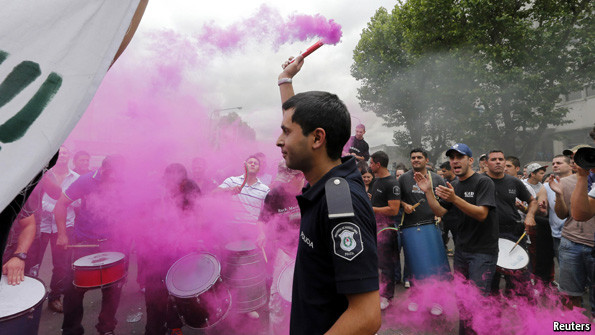Looting in Argentina

The looting began on December 3rd in Cordoba, Argentina’s second-largest city, when the provincial police force went on strike to protest against low salaries and poor working conditions. After more than 1,000 stores were plundered, hundreds of people were injured and one person was killed, José Manuel de la Sota, Cordoba’s governor, caved in, hiking the police force’s basic salaries by 33%. That ended the disorder in Cordoba but inspired police forces in other provinces to pull similar stunts.
Forces in 20 of Argentina’s 24 districts followed the example of their colleagues in Cordoba, inviting widespread robbery and violence. Opportunistic Argentines broke through shop windows and wrenched open doors to load up wheelbarrows and horse-drawn carriages with food, clothing and furniture. As of December 11th, most governors had settled with their police forces, offering salary raises of as much as 45%. In four provinces, however, the protests still continued.
Christmas-related pressure to buy gifts may have been one trigger for the unrest. Argentine provincial police officers do not earn particularly meagre salaries in comparison with other professions, but as with all Argentine workers whose wages are not index-linked, their earnings are eroded by an estimated inflation rate of 25%. The wages paid by provincial governments, many of which rely heavily on the national government for funding, often fail to keep pace with prices.
Overtime is a way of bumping up income: working extra hours often contributes the same amount of police earnings as base wages. But that leaves many officers exhausted and disgruntled. The police have also seen that picketing is effective. “The police have monitored thousands of strikes and in many cases seen those involved walk away with a reward,” says Diego Gorgal, a former undersecretary of security for Buenos Aires Province. “Why would they not try the same?”
As the governors scrambled to negotiate with their police forces and restore calm to the streets, the national government was largely absent. Gendarmerie forces were dispatched to some areas, but the president’s inner circle portrayed the riots as politically motivated. Ms Fernandez’s newly appointed cabinet chief, Jorge Capitanich, dismissed the strikes and looting as “deliberate actions aimed to inspire chaos and anxiety”.
Whether the president can keep brushing the protests aside depends partly on the response of other groups of workers, who have seen the rewards that have accrued to the police for striking. Sergio Berensztein, a political consultant, warns that given Argentina’s “explosive” economic circumstances, more public bodies are likely to revolt soon. “There is no doubt that we are headed for a series of social crises that will only escalate,” he says. More payouts would make already cash-strapped provinces even more reliant on the centre for funding. And that in turn increases the chances that the national government will need to print money, exacerbating rather than solving the problem of inflation
No comments:
Post a Comment